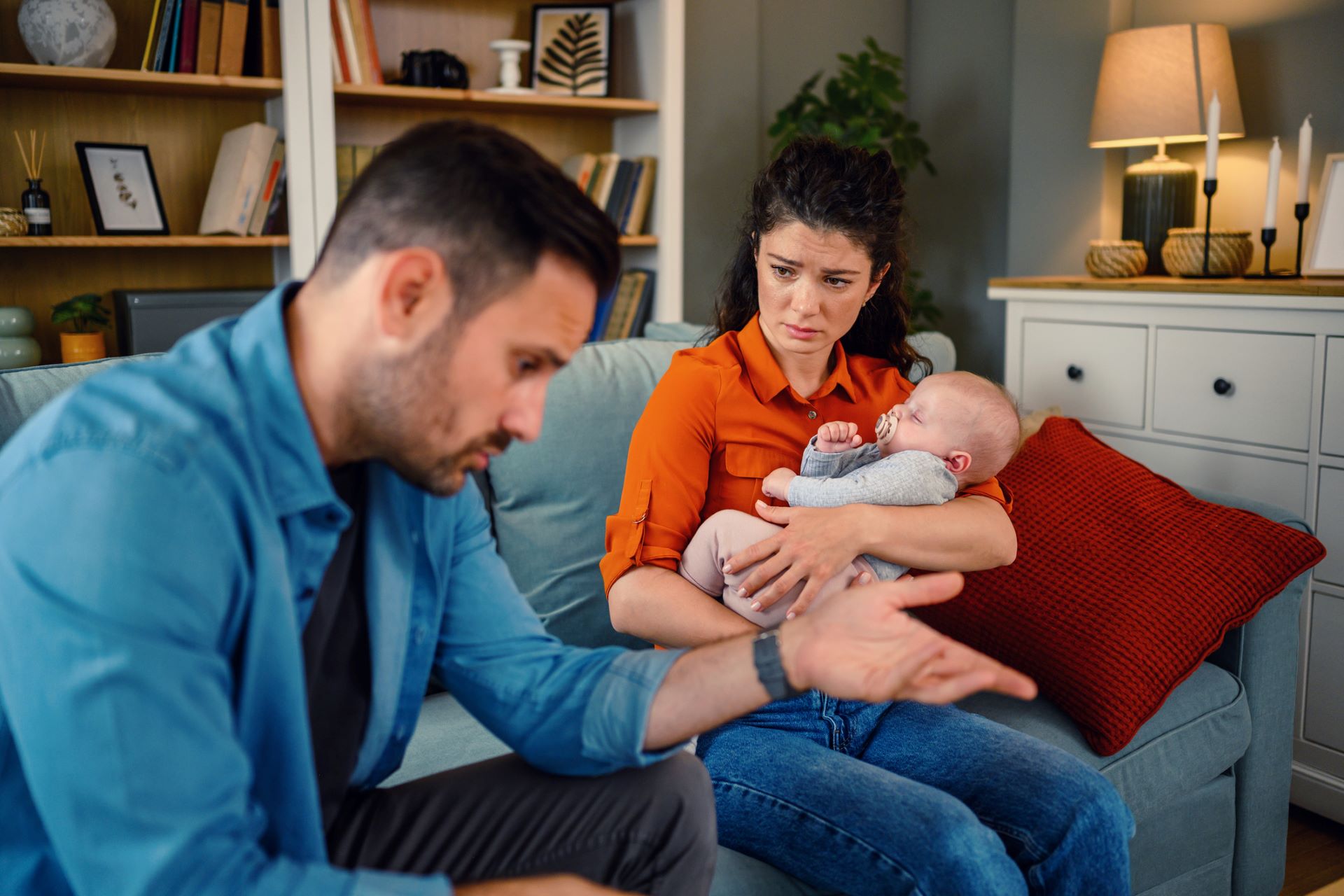
Feeling disconnected from your partner and after having a baby? You’re not alone. It’s very normal to experience a sense of disconnection from your partner after becoming a parent, and here’s why.
When we become parents, there’s no rulebook to tell us what to do or how to do it. And, for birth mothers It’s a massive life transition that results in an emotional rollercoaster of feelings, and it has a name - matrescence. Matrescence describes the process by which you become a mother and it can change who you are as a person. That huge change can affect how you connect with your baby and your mental load and it can take the spice right out of your relationship with your partner (we’ve got 27 tips to add the spice back in, by the way).
Understanding matrescence is taking time to adjust to your new role and be kind to yourself. But if you experience symptoms of postpartum depression or anxiety, seek help as soon as possible from your GP.
Family editor at GoodToKnow, Stephanie Lowe totally understands this; "After the birth of our son it felt like my husband and I were leading different lives. Mine was at the beck and call of a tiny human and his had barely changed, I bubbled with resentment. We bickered and argued and were never on the same page about anything. It took a while for us to find our groove again."
The good news is that this is entirely normal, and there are ways to navigate this tricky time. We’ve got five reasons you might feel isolated and disconnected from your partner (they may even be giving you the ick right now) and what you can do about it.
Feeling disconnected from your partner after having a baby
Feeling disconnected is a totally normal feeing. As, having a baby can be one of the most joyful experiences either of you will ever go through and it can also be one of the hardest times to endure in your relationship. While there are so many variables for feeling this way, one of the main and most natural reasons is matrescence.
Matrescence can cause changes in the brain that can last for years, say experts. While we don’t truly know how long these changes last, some studies have suggested at least six years, while a 2023 study from Trends in Cognitive Sciences journal suggests matrescence changes our brains permanently.
"Apparently it takes years to get back your sense of self. My daughter is 18 months now and I'm finally emerging from my 'mummy fug'. For a while, I hardly had any energy left over to invest in my marriage."
Suzana
These brain changes can result in mood swings, physical and emotional changes, and spark a process of self-discovery as you become a parent. All of this can play havoc with your relationship and make you feel more disconnected and isolated from your partner.
Just think about it for a second - the most important relationship you had before having a baby has now been eclipsed by the most life-changing relationship you’ll ever know. It’s no wonder problems arise. It’s important to remember that millions of parents are going through exactly the same transition as you and your partner, and there is light at the end of the tunnel.
5 reasons for feeling disconnected from partner after having a baby
1. You’re both exhausted and hormones are playing havoc
What it looks like: You’re wandering around like zombies half of the time, and when you’re doing that you’re getting irritated with each other, arguing over tiny things, and finding it hard to appreciate any efforts your partner makes. You also burst into tears and google divorce lawyers when they eat the last slice of cold pizza.
Why it happens: Caring for a newborn or toddler around the clock can leave you both physically exhausted and sleep-deprived. This makes it hard to regulate your emotions like you once did, so small niggles become huge arguments. All those hormones that your body released during pregnancy and birth are now plummeting, leaving you with low mood, feelings of sadness and even post-partum depression.
"Making sure that I got enough sleep was a big help for me in putting things back into perspective."
Lisa
What you can do about it: It may sound hard but get more sleep if you can, whenever you can. Acknowledge how tired you both are and reassure yourselves that this tough period will pass (it really will!). Read up on how those depleting hormones are playing havoc with your emotions and tell your partner all about it and why your low mood doesn’t reflect how you feel about them. Then stop feeling guilty about it, and give yourself a break.
2. You don’t have the couple time together that you once did now that your parents
What it looks like: You literally can’t remember what it’s like to have a hot meal together, at the same time, in the same room, never mind what it's like to go for a meal out. And the idea of curling up with them and watching a movie is around #787 on your ‘things I’d like to do’ list after hearing they had a nap while you went to the mother-baby playgroup this afternoon and dealt with the fourth poonami of the day.
Why it happens: You guys are in survival mode right now. Your baby’s needs are at the top of your priorities, and babies don’t understand the concept of free time.
What you can do about it: First, accept that you’re not going on a date anytime soon, and the most one-on-one couple time you can hope for in these early days is an hour spent putting together the cot bed while your baby sleeps. Second, find different ways to connect with each other. That could be a loving WhatsApp message, a note on the fridge, or a 15-minute check-in each day to see how the other person is doing.
3. You're touched-out from your baby and you feel like you have nothing left for your partner
What it looks like: It’s been so long since you had sex that you think your hymen might have regrown; the idea of skin-to-skin with anyone other than your baby gives you the ick and every time your partner touches you, you yelp. Anyway, how can you get intimate when you've decided to co-sleep?
Why it happens: You and your baby spend all day immersed in physical touch, especially if you’re breastfeeding. The idea of more physical touch from your partner can leave you feeling overwhelmed and even revolted. You may even feel as if your body isn’t your own right now and that can leave you feeling angry and powerless.
"Breastfeeding definitely affected my sex drive, too. I really wanted my body back for me for a while, when I wasn't feeding."
Kerry-Anne
What to do about it: Carve back some time for yourself in order to reclaim your own body. That might mean taking a shower or a bath or having a 10-minute walk outside alone if possible. Talk to your partner so they know it’s not their touch that you’re cringing from; it’s any touch and ask them to be patient. See if they can offer no-strings affection, like a foot rub or a shoulder massage, to help you feel more comfortable in your body.
4. You worry your partner doesn't like you anymore because you've changed emotionally and physically
What it looks like: You freak out when your partner says 'Wow' after seeing you get dressed. Turns out they just couldn’t believe you were only getting dressed at four in the afternoon.
Why it happens: Your body has undergone a marathon of growth and change - don't underestimate the impact. Along with joy at your baby’s arrival comes deflated breasts, swollen feet, flabby skin, stretchmarks and sheer exhaustion. Emotionally you're on a rollercoaster too as hormones fluctuate and plummet. Mood swings, anxiety, sadness, and irritability may feel like an ambush.
What to do about it: Again, it’s time to cut yourself some slack. Your body nurtured your baby for nine months. Don't expect it to snap back overnight. Pregnancy stretched your body in new ways and birth is an athletic feat! Be patient as your postpartum body heals, restores depleted resources, and finds its new normal. Give yourself at least six months before you evaluate your new post-pregnancy body. What you've accomplished is beautiful. Give yourself the same tenderness you give your baby. That goes for any emotional rollercoastering too - allow your hormones to settle down.
5. You resent your partner because of the extra emotional and mental load motherhood brings
What it looks like: When your partner asks how your day went, you itemise a list of every nappy change, feed and load of laundry you did, then flounce out of the room. But seriously, you’re so overwhelmed with the amount of planning, thinking, managing and firefighting you must do every day that you start to imagine your partner is another baby who needs looking after.

Why it happens: There’s no hormonal or physical reason behind this - it’s just something women have to deal with every day. Call it hidden load, mental load, emotional labour or invisible labour. It’s a fact that women do the majority of work when it comes to managing a household and family, including scheduling playdates, remembering birthdays, planning the shopping and anticipating every possible need your baby might have. Yes, it’s unfair and yes, it’s exhausting.
What to do about it: First, you’ll probably have to explain the term ‘emotional load’ to your partner. Then, you need to explain how having this extra burden of planning and remembering makes you feel, and how it impacts your wellbeing. Between the two of you, try to devise a way of divvying up those unseen tasks. Tell them you’d like them to notice when things need to be done, instead of waiting to be told to do them. Hopefully, the more you both do this, the less you’ll hear the familiar response, “I’d have done it if you’d only asked…”
Talking to someone who's not a friend or a family member can help. There are lots of ways you can contact a relationship counsellor, and some of them are free. Relate offers many different types of relationship counselling and Click Relationships is an online relationship support resource, which includes a free live chat with a trained counsellor. There are also some great relationship podcasts you can listen to, such as The Therapy Edit with Anna Mathur and Meet the Freemans.
Find out why relationships break down after having a baby and discover why hugging really matters. Plus, if you're wondering 'why have I gone off sex', here's why you're not alone.







